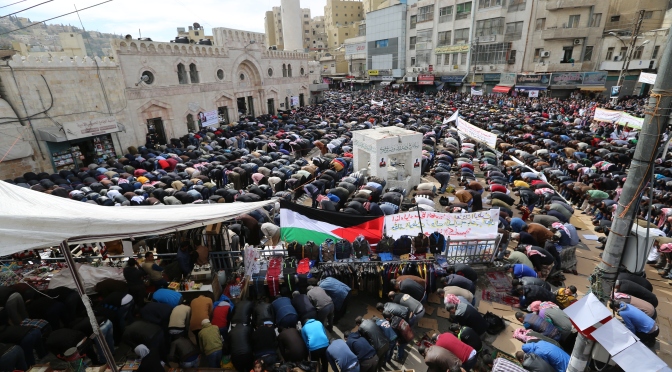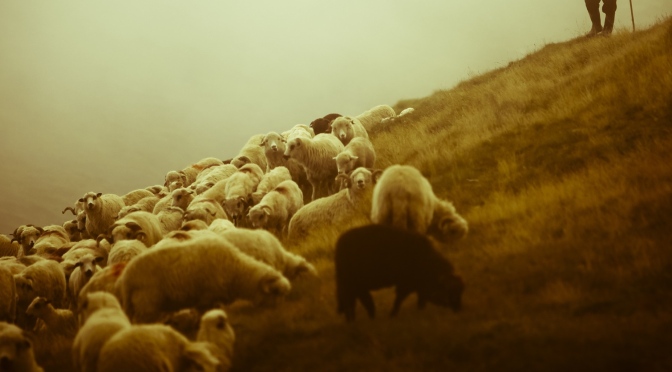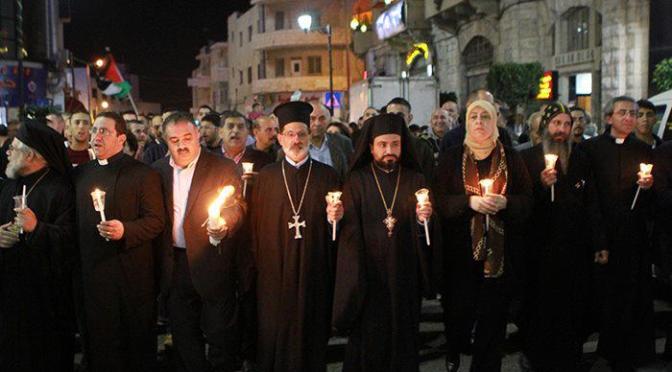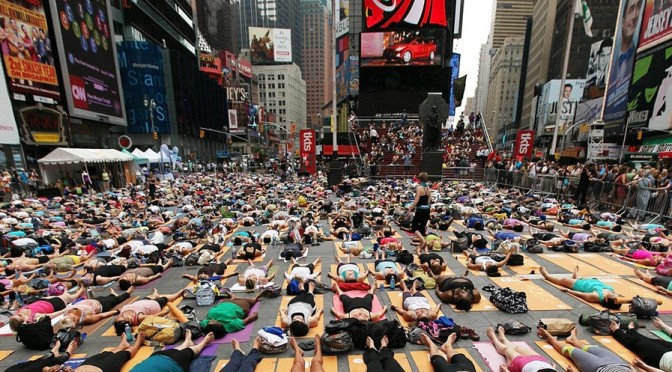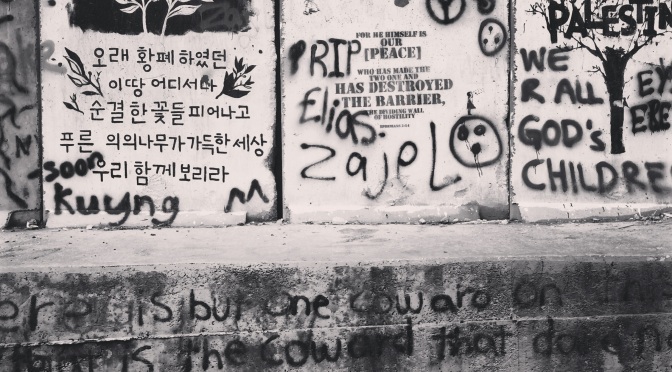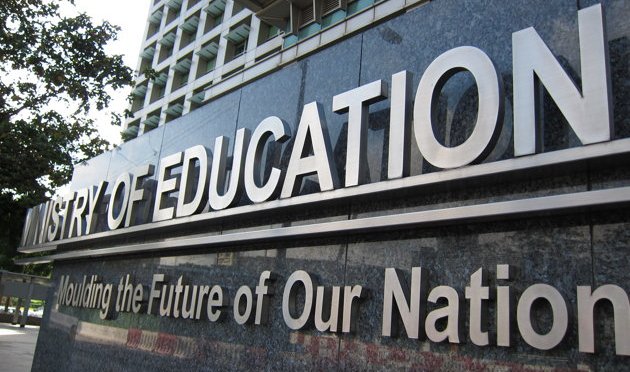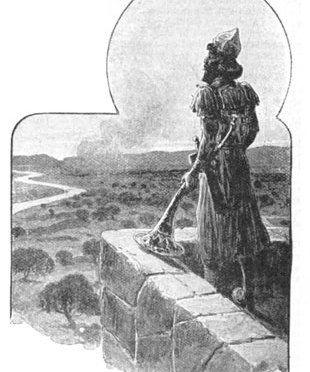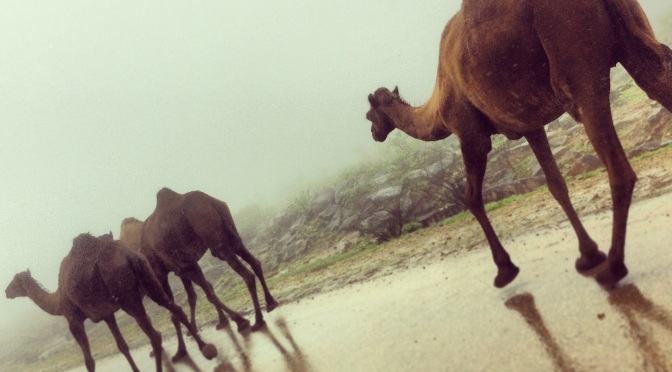“I will not die but live, and will proclaim what the LORD has done.” – Psalm 118:17
Khadra al-Kassasbeh presses her forehead against mine. The 90-year-old grandmother is so close I cannot see her eyes. She touches my cheeks and kisses them, hunched over and whispering, “You are his mother too. You are his sister, you understand. God bless his soul and God give you a thousand healths, you understand.”
I don’t understand, really, because I don’t have a grandson. I didn’t raise my son and his sons under olive trees on green hills in Karak. I have never lost a family member in war. I cannot fathom how it would feel to bounce a baby boy in my lap, watch him grow up strong and tall, hear him calling me jidda, grandma, and then watch him burned in a cage on the Internet.
I don’t think I’d believe it was real.
I hardly believe it is real even now.
Jordan is filled with hurt this week. I don’t feel a right to hurt along with the country because I am a foreigner, an outsider, a listener catching snatches of pain at its outskirts. I have tried to understand every event unfolding in this region. I watch all the videos, track all the deaths, think hard about different narratives, political motives, historical contexts and propagandistic purposes. I consider what makes people angry and desperate. I imagine myself or my father in an Iraqi prison, imagine my family members tortured and killed without reason, imagine watching my country torn apart, myself running out of money, more and more burdens heaping on my chest with no breath or hope to keep me upright – in my imagination, radicalization is not so far-fetched. I see why fear and hurt turn into hate. I see how I might pick up my passport, sneak onto a flight and fling myself toward a preacher’s promise of meaning, self-sacrifice and worth.
But this, I can’t understand.
All week long I’ve heard the word shaheed. Muath al-Kassasbeh, the Jordanian pilot who was shot down, captured then killed on video, is shaheed, a martyr, they say. He is shaheed of the nation and of truth, of Jordan and Islam and humanity and goodness, say the newspapers and radio and television and posters all over town. Thousands of people prayed and marched in downtown Amman with posters of his face, calling for death to ISIS and blessing to the martyr’s soul. Hundreds gathered in Karak for three days of mourning, filling a Bedouin tent in the same place where Muath held his wedding six months ago. The king honored his family with a visit as his father spoke to the crowd: “Muath is not just my son. He is our son, the country’s son, martyr for our nation.” Fighter jets roared overhead, coming back from anti-ISIS bombings in Syria. Muath’s neighbors and relatives cried. Young men pushed to the front of the crowd, shouting that they wanted to be shaheed as well. “Let us join the military. We will give ourselves. We will be like him.”
I am an outsider, but I feel the hurt. Karak’s people are kind and hospitable. They open their homes at a second’s notice, begging strangers to stay, stay for ten minutes, stay for three days, drink coffee, have tea, be with us, be together, be filled. Khadra al-Kassasbeh whispers blessings into my cheeks, and I am angry that anyone would want to hurt her. I spend an afternoon with Muath’s wife and sister, hearing their stories, then I go home to write. I am filled with adrenaline from reporting, eager to get the story out, but when I’m finished I still don’t understand. I am sad. I wake up at 5 a.m. and cry.
LORD, I pray. Why would You want Your children to die? Back in the Kassasbeh house, two family friends are trying to comfort Muath’s sister and wife. “For sure he is shaheed now,” they murmur. “For sure he is in paradise, he is happier, he is well.” The holiest people we know have all prayed for him, they say. The imams at al-Aqsa, in Mecca and Medina, thousands in downtown Amman, hundreds of thousands around the world, Muslims and non-Muslims alike, they have prayed! He is shaheed, he is happier, he is well.
The sister and wife say nothing.
I don’t say anything either, because I don’t know what happens to people after they die. I only know that I hate Death. It feels haram, blasphemous, senseless and cruel. The young men rush forward, crying to be made martyrs. I feel their anger but wish they wouldn’t go.
LORD, I pray. I can’t find the words for my questions.
When Jesus Christ died on the cross, I wonder if his disciples called him a martyr. I wonder if they sat in the dark on the floor, staring past each other’s faces, saying, “For sure he is happier now.” How dark it must have felt, how heavy the night, how thick the air pushing against their chests and breaths. I wonder if they were gripped with an urge to destroy something – the computer screen with a grandson shriveling into ashes, the world with its hemorrhage of pain, the cross dripping vinegar and blood, or their own selves, heaving for air and light.
The word shaheed shares Arabic roots with the meaning, “to witness.” Yushahid means “he watches.” Shuhada means “certificate.” A shaheed dies in testimony. But I sit with Muath’s wife and she tells me that he wasn’t sure about the airstrikes. Muath didn’t want to kill innocent people, she tells me, especially other Muslims. He’d wake up early before every strike and pray two extra raka’s at the dawn prayer, she says, asking God to keep him from causing death. The morning he was captured, Muath’s wife says, he’d asked the Lord for foggy skies.
If I’d been a disciple of Christ when He died, I don’t think I’d have understood. “He’s a martyr,” I might have mumbled. “He’s left us for Paradise.” But it would hurt.
I am awake at 5 a.m., turning Death over in my head, asking why God would want martyrs spawning martyrs, death making hate, birthing fear, calling young and strong and beloved children to throw their lives into flames. I am quiet, and then I hear.
The Lord Jesus, on the night he was betrayed, took bread, and when he had given thanks he broke it and said, “This is my body, which is for you; do this in remembrance of me.” In the same way, after supper he took the cup,saying, “This cup is the new covenant in my blood; do this, whenever you drink it, in remembrance of me.” For whenever you eat this bread and drink this cup, you proclaim the Lord’s death until he comes.
I told you that I’m leaving, Christ said to His disciples. I am going, I am going, I am leaving, I will be gone, He said, but they could not understand where, how or why. Do not fear, take heart, trust in Me, He said. I am going, but I love you. He knelt and scraped the mud off their feet.
It took days before they saw Him again, longer before they understood. I am the good shepherd, Jesus said. The good shepherd lays down his life for the sheep. I know my sheep and my sheep know me. The reason my Father loves me is that I lay down my life – only to take it up again. My sheep listen to my voice: I know them, and they follow me. I give them eternal life, and they shall never perish; no one can snatch them out of my hand.
I find words for my prayers. Ya rabb, thank You for Your witness. Ya rabb, You did not abandon us. Ya rabb, You were shaheed to the truth that You see us and love us, we who are frail, we who are tangled in our hollow boats and empty fishing nets. You are shaheed and yet victorious, the One and only One who caught the senselessness of Death and burst through it with spring and morning. You are the One lifting birds to sketch Glory in the air, the One drawing mountains into swells of indigo praise. You died to prove that You loved us, and then You lived.
Make me a witness too, I pray. There are festering poisons inside me that I beg of You to kill. Fear is gnawing at my spirit, anger stifling its breath. Pride will freeze me into stone and hurt is ticking toward self-destruction.
In the early morning, I ask God to cut these things away. Nail them on a cross. Burn them in a cage. Shear Your sheep that we might die to ourselves, but live in witness to a Shepherd who is alive. Make us humble. Make us meek. We press our cheeks to those around us, whispering: God is still here. God has come that we may have life, and have it to the full. God loves us. God still loves us. God will make us living sacrifices. God will make us shaheed, help us die only to live, help us find a second life.
God is our Shepherd. We shall not be in want. He will help us to love one another.
